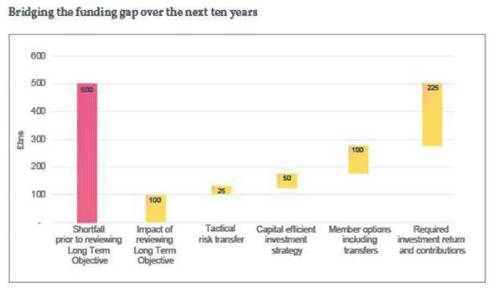The leading pensions and risk consultancy calculated in its report, ‘Maximising Value in DB’, that if schemes employed a wider range of opportunities to create value they could significantly chip away at the £500 billion shortfall. This would leave £225 billion, which could be more realistically eliminated through investment return and contributions.
Commenting on the report Alistair Russell-Smith, Head of Corporate DB, Hymans Robertson says:“Value for money is moving up policy makers’ agendas with The Pensions Regulator making recent recommendations on it. Taking advantage of new opportunities in the consolidation, risk transfer and investment markets could create billions of pounds of additional value across UK DB.
“Despite billions being paid into DB schemes many are still facing a huge deficit. Companies that are simply relying on investment returns and contributions to reduce the deficit could remain on-risk for many years to come. With 75% of schemes already cashflow negative there is an urgent need to fill the funding gap and this can only be done if schemes are open to thinking in a different way.

As Alistair explains: “Pricing for both pensioner buy-ins and whole scheme buy-outs is currently the most attractive that we’ve seen in recent years. Demand from pension schemes wishing to transfer risk to an insurer is greater than ever and we expect this to continue. There are also newly emerging ‘end-game’ solutions such as non-insured risk transfer and insured self –sufficiency. Our analysis of the FTSE350 shows that 5% of companies could transfer their DB scheme to a consolidator and 3% could buy-out with no cash injection. A further 17% could transfer to a consolidator and 13% could buy out with less than one month’s earnings1. Schemes should review their Long Term Objective in light of these developments. Across UK DB, this reduces the deficit by £100 billion.
Commenting on how other strategies employed by schemes can further contribute to reducing the deficit, Susan McIlvogue, Head of Trustee DB, Hymans Robertson, continues: “Alternative investment strategies are emerging in the DB world, making it possible for schemes to achieve the same investment returns for less upfront capital. If trustees adopt these capital efficient strategies, schemes can significantly improve their resilience to risk and more affordably achieve a stable income to meet benefit payments. If these were implemented widely, a further £50 billion could be wiped off the total UK deficit.”
“The increase in popularity and demand for DB to DC pension transfers in the wake of Pension Freedoms has already seen around £50 billion paid out of DB since their introduction. We’ve seen requests for transfer value quotations treble since 2015 and quadruple the number of transfers being paid out2. If this trend was to continue, transfers and other member options could reduce the DB UK deficit by as much as £100 billion.”
Susan concludes: “The need for DB schemes to seek value for money is becoming increasingly important. In its latest guidance on 21st Century Trusteeship, The Pensions Regulator recommends that DB schemes assess value for money and anticipates that this will feature in the forthcoming DB Chair’s Statement. Value is often associated with reducing running costs but there’s a danger that schemes focus on this area alone. Instead, trustees and sponsors need to look beyond their traditional options and explore a broad spectrum of opportunities to maximise value. If they do this there is with the potential to create £275bn of additional value across UK DB and ultimately halve the deficit.”
|

